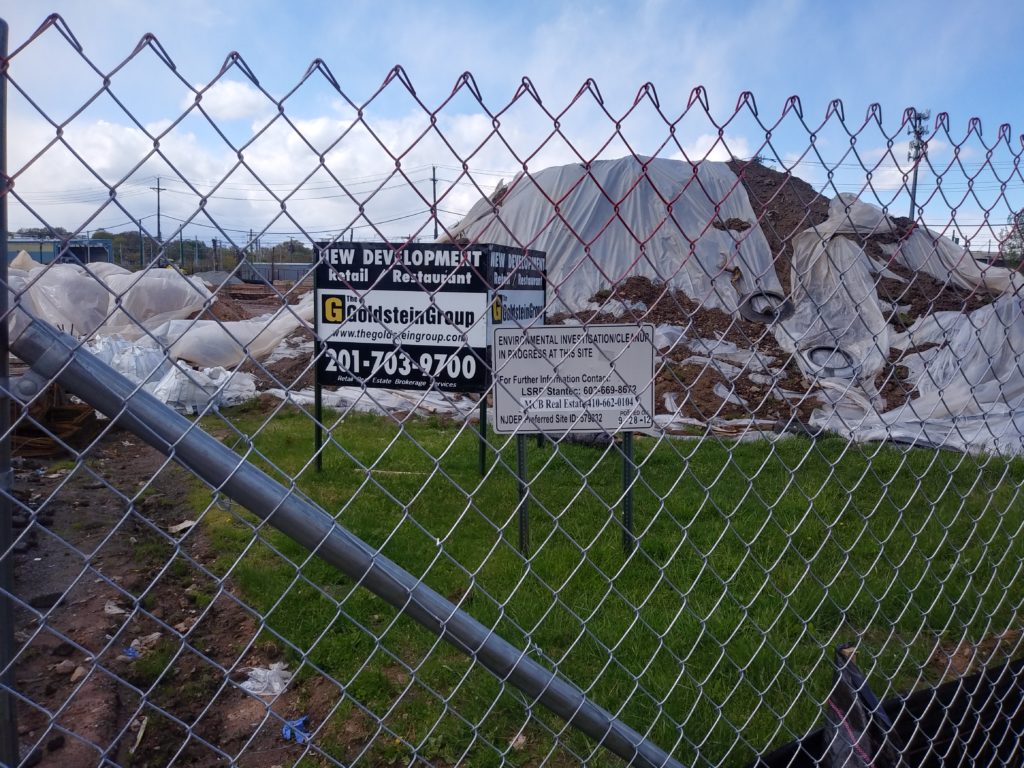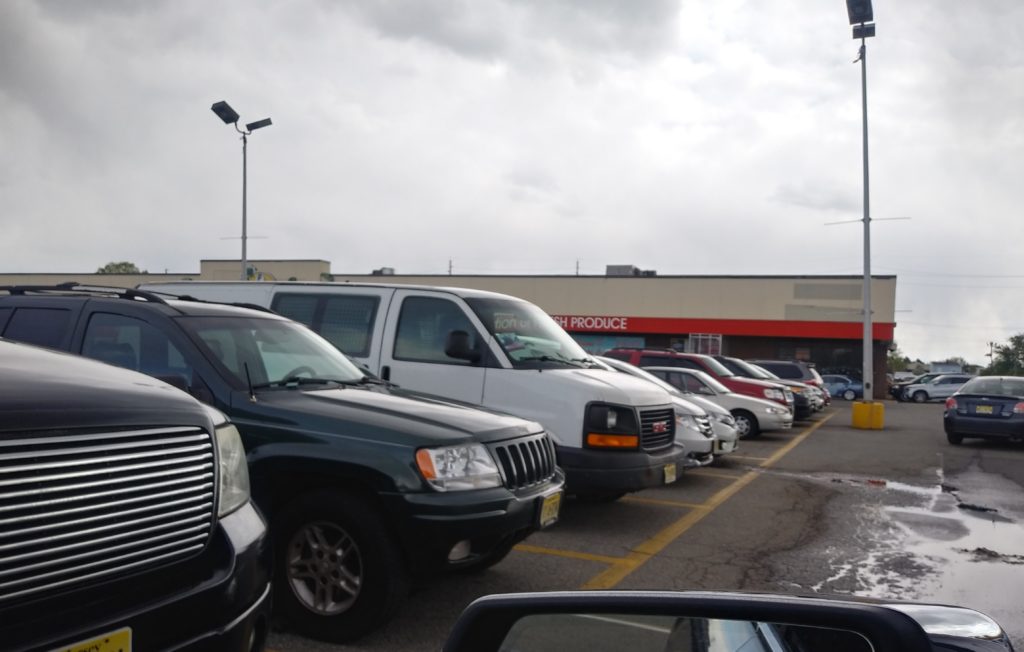
For at least three weeks now, large mounds of dirt and broken concrete have sat at a construction site on the north side of 81-179 Belmont Avenue, where two large mixed-use buildings with retail/commercial space and a total of 232 residential units are being built.
This depressing sight is beheld by Silver Lake residents and all those who travel the length of Belmont Avenue past Franklin Street, as well as SuperFresh customers and employees, who now have to jam their cars into a diminished parking lot, since a substantial part of it has been sacrificed to the construction site.
In case anyone forgot or doesn’t know, the property was once part of the Silver Lake Chemical Works, operated by Thomas Edison and where batteries and chemicals were manufactured. Chemicals and elements leaked into the ground over the years. We have covered this in our overview of a chapter from Dr. George Hill’s book Edison’s Environment. Here’s the actual summary, submitted to the New Jersey Department of Environmental Protection, of the contamination found in the soil as detected by soil and groundwater testing.
The mounds appear to be dirt excavated from the property as construction has started. Also, as Mayor Michael Melham and some of his supporters claim — it could be the beginning of remediating the contamination on the property to NJ DEP standards for residential occupancy. In any event, these mounds of potentially contaminated dirt — covered by flimsy-looking, hole-ridden and torn plastic tarps — have sat on the property for nearly a month!
With the rainy and windy weather Belleville has experienced for a good part of April and early May, one may wonder if soil particles haven’t gone airborne or been carried away into the streets or the SuperFresh parking lot by rain runoff. Granted, a Belleville Watch reader informed us he saw and briefly spoke with a person who claimed to be monitoring air quality at the site on behalf of the developer, but at night and on weekends, the site appears deserted. Wind and rainstorms don’t occur only during working hours.

In many American cities and towns, local officials would frown upon, or at least express curiosity about, unsightly (and perhaps dangerous) conditions at a construction site, as well as be concerned about the impact of construction on a local business. Yet, Town Hall under the Melham administration appears wholly unconcerned about the matter.
Perhaps that shouldn’t be surprising. After all, Melham enthused over the development’s concept in an Observer article after he declared his candidacy for mayor. The development — approved by the Planning Board in April 2018 under the Kimble administration — became a favorite talking point in pursuing his redevelopment and gentrification agenda, apparently to change Belleville into “Hoboken on the Passaic.”
A Montclair-based developer, then associated with the project, and who testified before the Planning Board on behalf of the Belmont Avenue development, was apparently present at a Team Melham fundraiser in June 2018, as seen in pictures on Melham’s Facebook page. (The developer, Brian Stolar, is shown in the bottom right photo, in jeans and a powder-blue jacket. He is allegedly no longer associated with the development.)
Melham was challenged about the fundraiser at a Town Council meeting (Editor’s Note: I brought up the issue at a Town Council meeting a few weeks before a key vote on the development, stressing that voting on anything related to the development could be seen as unethical or at least inappropriate.) Melham openly scoffed at the suggestion that he and other council members who attended the fundraiser should recuse themselves from voting on anything concerning the development because, he reasoned, the event was allegedly disclosed in reports to the New Jersey Election Law Enforcement Commission.
Persons familiar with the ELEC search engine and databases have apparently had difficulty finding a record of the fundraiser in either the Team Melham committee reports or in those filed individually by the Team Melham candidates.
Melham and a few of his close supporters attended the Planning Board meetings in March and April 2018 when the Belmont Avenue development was discussed and approved; he heard the same testimony and questions about the soil and groundwater contamination, and he heard the objections and questions from Belleville residents. Despite this, not only did he and the Town Council not take advantage of opportunities to stop the development, they essentially rubber-stamped it through the process, at least until two council members had a late-in-the-game change of heart about it and voted no to the tax exemption.
Something that Melham and his supporters try to emphasize is that the developer promised money to improve parking in Silver Lake. With potentially 232 or more people living in this development — and more than a few will likely have cars, contrary to the rosy picture painted that many residents will simply Uber or use the Newark Light Rail to get around — such an arrangement sounds more like a necessity than a generous contribution.
Earlier this year Melham, deputy mayor Vincent Cozzarelli and Councilman-at-large Thomas Graziano held for the project what might have been the most low-key groundbreaking in political history . In light of the well-known objections to the development from the Sierra Club of New Jersey as well as those of local residents, it’s small wonder the mayor may not have wanted attention drawn to the ceremony.
The unsightly (and poorly covered, by appearance) mounds of potentially contaminated soil and the inconvenience SuperFresh employees and managers suffer by having to jam their vehicles into an extremely diminished parking lot could be just the start of disruption in Silver Lake with this development.
Despite the bright picture the developers’ representatives and experts have painted for the town, it remains to be seen how many people will rent units in this development, how many vehicles they will bring with them, and how many school-age children could potentially be added to Belleville’s already bursting-at-the-seams school system. Never mind its potential impact on the town’s failing infrastructure — roads, sewers, and waterlines — in a neighborhood already teeming with traffic most of the day.
If this is the best that the Melham administration can offer Silver Lake and Belleville at large, its best just won’t do.
